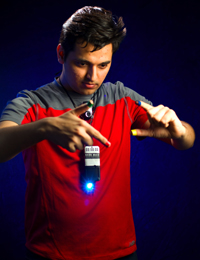Communications of the ACM
MIT Student Develops Wearable Interface That Relies on Hand Gestures

Pranav Mistry
Dr. Pattie Maes, Director of the Fluid Interfaces Group at the MIT Media Lab and Pranav Mistry, a graduate student within the same group, have developed 'Sixth Sense,' a wearable device that presents the user with a revolutionary way to interact with the world. Sixth Sense enables its wearer to summon data or virtual gadgets, such as a watch or mobile phone, interact with these virtual objects and dispose of them at will. The device, which premiered at the TED conference last month (to a standing ovation), will be demonstrated at ACM's Computer-Human Interaction (CHI) conference on Tuesday, April 7th at the Hynes Convention Center in Boston, Massachusetts, USA.
"We had a desire to see if we could have seamless access to data or information that may exist to help us make decisions. Sixth Sense provides access to relevant information about the things in our environment and enables new interactions between the real world and the world of data," notes Dr. Maes.
"Although the miniaturization of computing devices allows us to carry computers in our pockets, there had been no link between the digital devices we carry and our interactions with the physical world. We developed Sixth Sense to seamlessly integrate information into reality. It serves to bridge the gap by bringing digital information out into the tangible world, and allows us to interact with this information by using natural hand gestures," explains Mistry.
 MIT graduate student Pranav Mistrymanipulates a projected image using hand gestures in a demon-stration of Sixth Sense, a wearable computer that supports interaction with virtual devices. ACM SIGCHI MIT graduate student Pranav Mistrymanipulates a projected image using hand gestures in a demon-stration of Sixth Sense, a wearable computer that supports interaction with virtual devices. ACM SIGCHI |
More than 2000 professionals from over 40 countries are expected at this year's conference, which marks 27 years of research, innovation and development of the Computer-Human Interaction community. CHI 2009 is sponsored by SIGCHI, the ACM Special Interest Group on Computer Human Interaction. Organizations contributing to the financial support of the conference include Autodesk, Inc.; Google, Inc.; Microsoft Corp.; and the National Science Foundation (NSF).
No entries found